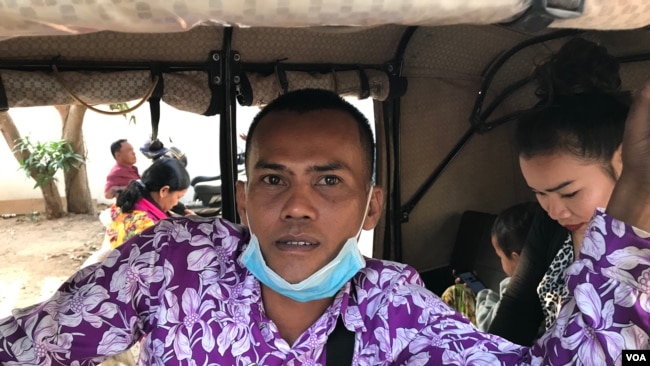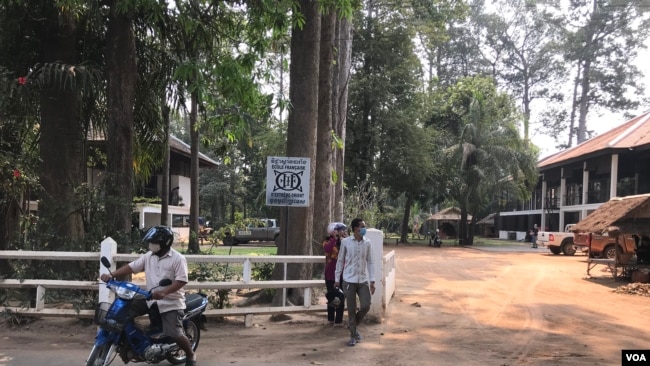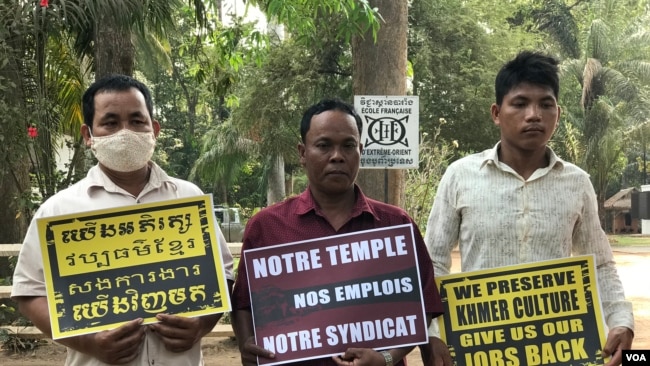Unemployed Siem Reap Temple Workers in Limbo, As French and Cambodian Officials, Fail to Find Resolution
SIEM REAP, CAMBODIA —
Tuy Kdong, 39, drove his wife, Yun Pi, and young daughter in their Indian-made tuk tuk to the center of Siem Reap town last week. He stops outside the École française d’Extrême-Orient (EFEO), where a number of his former colleagues are ready to begin their protest.
The out-of-work temple worker was helping to restore the Western Mebon temple within the Angkor Archaeological Park, a craft he had mastered over the years.
But a dispute involving EFEO, the French Embassy and the Apsara Authority, which administers the tourist site, over wages and employee benefits has left 126 workers without any work for nearly two years. And, in the meantime, the Apsara Authority has hired other workers for allegedly lower wages.
“I still urged them to help me get back my job,” Tuy Kdong said. “I don’t have high hopes, [but] we will keep protesting so that we would be able to return to our work.”
For Tuy Kdong, getting reinstated would mean he could pay back the monthly installment on the $6,500 in loans, which he took from Prasac and AMK microfinance institutions (MFIs) to fund construction of his home and to buy the tuk tuk he sits in as he speaks to VOA Khmer.
To make matters worse, Yun Pi, Tuy Kdong’s wife, lost her job at a massage parlor in Kampong Cham province, as the coronavirus pandemic causes tourist-related businesses to shutter their operations.
“If the [MFIs] want to take the [tuk tuk] back, let them take it,” Yun Pi said. “I don’t have any more ability to make money and what else can I do because my skill is to give massages?
With his wife unable to earn the $7.5 to $10, Tuy Kdong’s daily income from riding his tuk tuk was making it hard to make ends meet.
“For the last few days, there is no income because there are no guests and no bookings,” he said. “I couldn’t even get 10,000 riels ($2.5) because there are no bookings.”
The controversy has left the skilled temple workers in limbo for the last two years, leaving some of them indebted and with little opportunity to use their skills, which is a precious commodity in the restoration of Cambodia’s Angkorian temples.
The project to restore the West Mebon was first funded by the French Embassy, under the stewardship of EFEO and in collaboration with Apsara Authority. In light of giving workers better benefits, EFEO and the workers’ union negotiated a collective bargaining agreement, which considerably benefited these workers.
However, after EFEO said the French had stopped funding the project in 2018 it handed the project over to Apsara Authority. Temple workers said the government body slashed their salaries and reduced benefits, a move made possible because the collective bargaining agreement had lapsed.
Even as 126 workers protested Apsara Authority’s new terms, the temple administration went ahead and hired new workers, effectively terminating these workers, EFEO and the French Embassy kept passing the buck.
Since then, the workers have pushed the French and Apsara Authority to find them a resolution, including compensation for loss of salary over the last two years.
Apsara Authority in a statement issued March 15 maintains that the workers are free to return if they accept the government body’s terms, though this would be done following a review of the project’s requirements.
Long Kosal, spokesperson for the Apsara Authority, said the current dispute was between the EFEO, the French embassy and workers, and not the temple-governing body.
“This is not the obligation of the Apsara National Authority, the [workers] should stop this issue,” Long Kosal said. “The ones who made promises to them is the party who agreed verbally with them.”
Long Kosal is referring to a verbal agreement between EFEO and workers to continue in principle the collective bargaining agreement, even after it lapsed in 2016.
“There are already workers who are working there currently. So, we can’t accept them back at the construction site because enough workers and experts are fulfilling the tasks,” he said, adding that the terminated workers could apply for future job vacancies.
The workers, who are now represented by the Building and Wood Workers Trade Union of Cambodia, have targeted their protests at EFEO and petitioned the French Embassy in Phnom Penh.
At last week’s one-day protest outside EFEO, workers could be seen holding signs that read “We Preserve Khmer Culture; Give Us Our Jobs Back,” in English, Khmer, and French.
Ung San, who lives in Siem Reap town’s Kork Chak commune, said the group of workers had expected to be laid off for only a few months as the project transitioned from EFEO to Apsara Authority. She was still waiting to get back to work.
“It is difficult to raise my children. I am just waiting for them [EFEO] to reinstate us, so I dare not to look for another job,” she said.
Her colleague, Khon Khorn, was a stone sculptor and had helped with restoration work at the famous Baphoun Temple for 15 years, before joining the West Mebon team in 2012.
Like many of his fellow temple workers, Khon Khorn has had to take to other odd jobs, such as rearing cattle, to make a meager living to support his family.
“I can’t do anything else. I just stay at home, raising cows,” he said.
Sou Chhlonh, vice president of BWTUC, said Long Kosal’s suggestion that workers had been compensated by EFEO, bringing the conflict to an end, was untrue.
He said temple workers had received some seniority payments and their last few salaries but had not been compensated for the last two years of lost remuneration.
The worker representative said the union had unsuccessfully sent multiple letters to the French Embassy, and workers were considering approaching Prime Minister Hun Sen next.
“They are skillful workers who have worked for more than 20 years in fixing the temples from one to another. So, please Samdech [Hun Sen] help them get back to work,” Sou Chhlonh said.
Khun Tharo, with worker rights NGO Central, said the temple workers were very skilled as evidenced by their restoration of the Baphoun Temple, and that authorities should reinstate them to make use of their skills.
“That’s why we appeal to not only the EFEO but also the Cambodian government, and the French embassy in Cambodia to reconsider their financing for restoration of the temple, and to ensure skilled workers can go back to work,” Khun Tharo said.
VOA Khmer visited EFEO on two occasions in Siem Reap, but Brice Vincent, head of the EFEO center, declined to comment on the dispute. He said he needed his French superiors to approve his comments to the media. “So, I don’t want to talk about this issue with the press right now,” he said.
Back at Tuy Kdong’s home in Siem Reap, Yun Pi, his wife, is now worried about losing their land, which could happen if they fail to pay the monthly installments to the two MFIs.
The small plot of land, with a small house made of a bamboo exterior and tin roof, is the only asset the couple owns, apart from their tuk tuk business. The loss of the land would leave the family with nothing.
“If we don’t pay, they will have no choice but to seize the land,” Yun Pi said. “I want them to have leniency because I can’t earn money to pay.
Source: VOA







